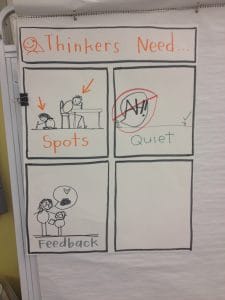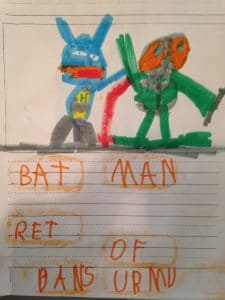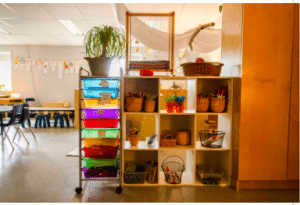26 Feb Writing Workshop and Social Emotional Learning

Working on what we need to do our best work in writing, reading, and thinking in general
Fancy title, eh?
One of the conversations Christine and I find ourselves having lately with lots of thoughtful educators is about the tension between curriculum demands and wanting to support children in their social emotional development. Those two ideas don’t have to be in direct opposition if we keep kids centered as the curriculum. We can work in proactive and thoughtful ways to work on both at the same time, What follows is a quick walk through of the ways that we can use writing workshop to both foster a sense of belonging and teach into the complexity of being a human being, while still getting at the skills of writing.
Elena Bodrova and Deborah Leong in their book Tools of The Mind discuss the idea that there are few aspects of learning that do not have the imprint of the dominating culture. They write:
A child does not just become a thinker and a problem solver; she becomes a special kind of thinker, rememberer, listener, and communicator, which is a reflection of the social context. (p11)
There is no “just” learning writing, all learning- whether it be about common denominators or endings to stories- takes place with a social and cultural context. If we are not thinking intentionally about that, then it happens on a subtle below the radar plane. One way to support social emotional learning is to to bring out these skills and be much more explicit and thoughtful about the social learning that occurs in everything we do.
Part One: Messages About Belonging.
Alfred Adler, child psychologist, doctor and psychiatrist, has the theory that “people are motivated by the need to belong and be significant.” (The Good News About Bad Behavior 89) If we are cultivating communities that are inclusive of difference, we have to make sure we value difference in our day. This can feel hard if we have learned that there is a”right” way to do things. When I first started this writing workshop work I was very adamant about their being ONE writing process. “DRAW THEN WRITE” I would say to the children. “DRAW THEN WRITE” I would say when I became a staff developer. “DRAW THEN WRITE” I tried to say to myself as I developed my own writing life. Then I realized something, many other people knew. You don’t have to draw then write. You can write then draw. You can draw a little, write a little, draw a little more. You can never draw. You can draw for a long time. All of those things are a part of your writing process.
We can help build empathy and inclusivity in our classrooms, and ensure children feel deeply rooted and valuable in our community by embracing the many ways we can write, the many stories we can tell, the many ways writing can look. Here are some thoughts about sending messages of belonging within writing workshop.
| Do I often… | Then I can try… | So children learn.. |
| Use the same mentor texts? | Finding mentor texts where the authors and subjects are a better match for my children. Lee and Low is a great resource for inclusive books, and books by authors of color. | Authors look like me.
Authors write about things that matter to me. Authors write in ways that sound familiar to me. |
| Emphasize one writing process as THE writing process | Teaching that the writing process can go more than one way. Encourage children to try their own ways until they find one that helps them be productive and engaged. | Writing is a personal process that changes over time. The process reflects the writer and what they need to be successful. |
| Model stories of my own life, that aren’t necessarily connected to kids (eg My Wedding Day) | Modeling writing stories closer to the age and interests of your children. Model gross stories, scary stories, sad stories, mad stories. | Writing is not just about nice times, but a way to express yourself and your interests. |
| Prohibit certain topics (video games or movie plots) | Remembering that fanfiction is a genre. Treat all writing as valuable and interesting if the writer finds it to be so. Try not to regulate topics instead know you can support writing development on any topic. | My voice and my interests belong here. I belong here. |
| Provide specific paper and require one kind of writing utensil | Open up options to different kinds of paper (colors, lined and unlined) and different kinds of utensils, Sometimes children have sensory barriers and engagement barriers that we can eliminate through choice | Writing isn’t about the tools I use, but the thoughts I put on paper (or ipad, or computer) |

“Batman ripped off Bane’s arm” Writing skills met: spacing, stretching words, word choice, visualizing and using representational drawing.
Part 2: Provisioning a Writing Workshop with Social Skills in Mind
Setting up for a writing workshop means setting up for just-right social challenges. Just like a too-small line up space causes conflict every time we try to leave the classroom, how our writing materials are organized can provide opportunities for practice at being in a community.

A writing center with communal supplies- including scissors, staplers, and sharpies
| Do I often… | Then I can try… | So children learn.. |
| Keep supplies away until I distribute them | Place them in locations where small groups of children can access them independently | They have agency and power to make decisions about tools |
| Monitor stapling, marker, tape, and other materials | Allow children to experiment with time and responsibility, and follow up with lessons as needed | They are trusted and responsible |
| Use pencil boxes | Use community supplies | To develop negotiation skills, turn taking, and sharing |
| Keep writing materials in one space | Have several spaces around the room | How to negotiate these skills in smaller groupings |
| Say “NO MARKERS THIS ISN’T ART WORKSHOP” ** | To release the grip on markers and see how color enhances children writing and storytelling | Writers think in color and image as well as in words |
** I used to say this
In part two of this post, we will talk about the actual teaching of social skills as lessons within and across writing workshop. Supporting social emotional development is not about the perfect thirty minute lesson about respect, the same way writing a lesson in your school of education did not prepare you the realities of teaching. Social skills emerge in the complex messiness of classrooms and learning. Our work is to be ready for it, to communicate belonging and capability, to rise to meet the challenge of what it means to be a teacher in classrooms today. We think of this as kids first workshop teaching and we’d love to keep thinking with you about it!
(shameless plug)
For Professional Development and School Wide Coaching Inquiries:
For East Coast Inquires: christinehertz@gmail.com
For West Coast Inquiries: kristimraz12@gmail.com

No Comments